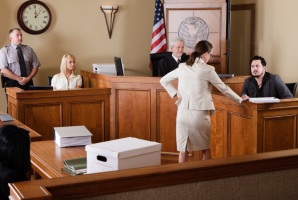 The most important part of a personal injury trial is the plaintiff’s testimony. Specifically, the most critical part of a trial is the personal injury plaintiff’s direct examination. If it doesn’t go well when you are in total control of the process and the facts, it will be nearly impossible to get a favorable damages award. We believe in thoroughly preparing the plaintiff to testify, both on direct and cross-examination. I would not be surprised to learn that our firm spends more time on direct examination preparation than any firm in Maryland.
The most important part of a personal injury trial is the plaintiff’s testimony. Specifically, the most critical part of a trial is the personal injury plaintiff’s direct examination. If it doesn’t go well when you are in total control of the process and the facts, it will be nearly impossible to get a favorable damages award. We believe in thoroughly preparing the plaintiff to testify, both on direct and cross-examination. I would not be surprised to learn that our firm spends more time on direct examination preparation than any firm in Maryland.
Witness preparation is a broad term that covers any communication between a lawyer and a prospective witness done to get the most favorable possible substance or presentation of trial testimony. It also helps the lawyer know precisely what the witness will say on direct examination.
By the time the trial draws near, most experienced personal injury lawyers will have a pretty good idea of what’s out there as far as potential cross-examination material. This comes from a variety of sources: interrogatory answers, medical records, deposition testimony, prior medical history, etc. But you really do not know what someone will say until they tell you what they will say. And, as experienced trial lawyers know, even then you are still not entirely sure what will come out of the witness’ mouth.
Job #1: Be a Likeable Human Being
The jury does not have to love a witness for that witness to be effective. But the jury has to like you well enough to respect you and believe you are telling the truth.
The most essential witness preparation we do is guide the witness on the goal of the testimony and what is appropriate courtroom demeanor, particularly on cross-examination. The witness needs to know the details about the process, the oath, and what they can expect so they are not taken off guard by how it will all go down.
In terms of performance, witnesses should speak slowly, clearly, and communicate, particularly on key points, directly to the jury. Many people are under the good faith impression that you to fight the defense lawyer on cross. Nothing can be further from the truth, and if a witness cannot control her rate of speech or temper on cross-examination, it will burn a lot of the good things done on direct examination.
Practice, Practice, Practice
Obviously, with attorney-client privilege and greater ability to take the witness’ time to prepare, the preparation of the client will be the most detailed and it should come off as practiced. Actually, it is usually better because the client gets to talk to real people as opposed to pretending to do so.
It’s important to always take the client through the significant areas of cross-examination. I do this by explaining what is likely to be asked. I also walk the client through the source material while explaining why the particular fact is a topic of interest for cross. This is all very gentle. But at some point, the client has to be ready to go.
In our office, we do full-on mock cross-examination of our clients before trial. The lawyer doing the practice cross is always somebody who is not involved in the case for extra realism. We have found this is pretty effective. We have also videotaped the practice cross so that we can play it back for the client to give them the full picture of how their testimony will be perceived by the jury. But this is not something you do with every client.
 Baltimore Injury Lawyer Blog
Baltimore Injury Lawyer Blog

